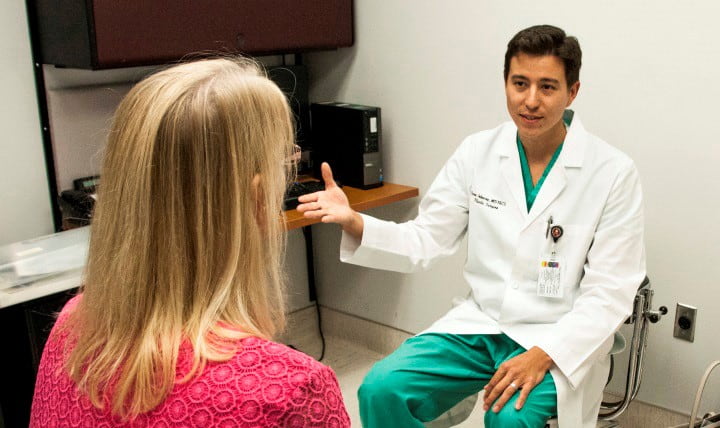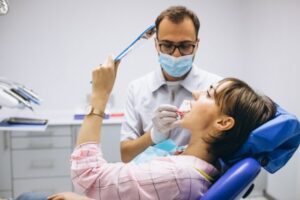The coronavirus pandemic has resulted in the placement of many restrictions such as stay-at-home, social distancing, and cancellation of non-essential services. Although health care is considered an essential service, some doctor appointments might be put off. Most people that seek medical services resort to using telehealth or ‘virtual visits’ because of fear of contracting COVID-19 at the hospital. Moreover, most health clinics and hospitals carry out mass testing and caring for newly infected coronavirus patients.
One might wonder what they should do when they need to visit a physician or during a medical emergency. Others might fear overwhelming hospital facilities during the pandemic and therefore opt for other options apart from typical doctor visits. Here is a guide on staying safe from the COVID-19 while receiving care that you might require and precautions taken at Becker ENT & Allergy Hospital.

Table of Contents
Guidelines for appointments.
The guidelines details are defined by where one lives and the number of COVID-19 cases in that community. You might need to cancel medical appointments to contain the spread of COVID-19 and ensure your safety. The official guidelines state that clinics and doctors should prioritize emergency and urgent visits. Such a move is geared towards ensuring people remain healthy and maintain essential supplies.
Some physicians and other professionals in the healthcare field are postponing elective procedures and routine visits. Elective procedures are procedures planned, such as colonoscopies, mammograms, and tonsillectomies. Regions might differ in handling severe conditions and procedures where some will not delay these therapies while others might all together postpone them. Besides, your location plays a role in setting up the guidelines that physicians use to postpone or carry out appointments.
Virtual visits.
As more people abide by the lock-down and stay-at-home directives, physicians connect with their patients through tele-medicine. Tele-medicine appointments like video consultations to follow up with your physician during this pandemic. Currently, hospitals and clinics are getting overwhelmed with vast numbers of COVID-19 patients who are booking online appointments is ideal. Moreover, officials have transformed the regulations involved in tele-health, such as Medicare, to make it readily available to patients.
Before the pandemic, accessing Medicare was at a cost, but the roll-out of Centers for Medicare and Medicaid Services (CMS) by president Trump extended its service provision. The CMS targets individuals at risk of developing COVID-19 complications and help them lead a healthy life. Additionally, CMS has enabled tele-health platforms to assist community members in curbing the spread of the corona virus. Tele-medicine is an essential tool for delivering care remotely to patients while eliminating the risk of contracting the virus during hospital or clinic visits.
Medicare tele-health services.
According to physician Susan Wehry, technology should assist those that require routine care while those with mild manifestation receive home care under virtual supervision. Currently, Medicare allows telehealth providers to treat and consult new patients across the United States. Dr. John Hopkins created the Medicare Telehealth Hotline in response to the COVID-19 pandemic that provides free access to physicians across the US for Medicare users. Hopkins hopes that Medicare Telehealth Hotline will keep geriatrics away from the emergency department because older people have weaker immunity predisposing them to COVID-19.
COVID-19 guidelines.
Before making a face-face doctor visit, you should visit the website or call the clinic or hospital to know what the institution is doing to keep individuals safe during the pandemic. Some of the general safety requirements include mask wearing for both visitors and staff, social distancing in the wait rooms, check-in, and exam rooms. Check if the clinic follows strict and regular cleaning protocols for frequently visited and touched surfaces in the clinic. You should be aware of the maximum limit of people the clinic could house simultaneously and temperature screening before entering the facility.
You should see if the clinic has special measures, isolation protocols, tele-medicine appointments, and personal protective equipment for staff. Once at the hospital or clinic, most institutions accept electronic billing to prevent the virus’s possible transmission. Most clinics provide or require one to wear face-masks and hand sanitization with at least 60% alcohol. Preferably, one should carry their sanitizer or use a pedal-operated hand sanitizer at the facility.
Alternatively, you can wash your hands for a minimum of 20 seconds and avoid touching surfaces within the clinic, your eyes, mouth, and nose. One should sneeze or cough inside their elbow, mask, or a tissue. During a doctor’s visit, maintain at least 2 meters or social distance within a clinic and follow the social distancing markings if provided.
Touch-less payment.
Most hospitals and clinics prefer touch-less payment options such as mobile payment systems to avoid germs and viruses through physical cash or cards. If a facility lacks mobile payment, you can use checks, money, or credit cards and clean it with a hand sanitizer with a minimum of 60% alcohol immediately after. People are advised to wash their hands with running water and soap when they reach home after visiting a doctor.
Avoid making contact with often touched surfaces like elevator surfaces, touchpads, and doorknobs because they could be teaming with coronavirus germs even after regular cleaning. If you touch these surfaces, one should clean their hands thoroughly with water and soap or a hand sanitizer. Instead, you can wear gloves or use a piece of tissue to touch these surfaces without exposure to the virus.
Plan for prescriptions.
Like other medical practitioners, pharmacists have become more busy and involved in the patient care process because of the rising numbers of positive cases. Therefore, you should plan for any prescriptions, whether refilling or new medicines, to avoid making unnecessary trips into the pharmacy department. Contact your physician to get more abundant medication supplies and receive it via local delivery or receive it by mail.
Pediatric care during the pandemic.
The coronavirus guidelines of social distancing, respiratory etiquette, and hand sanitization still apply for pediatric clinics. These clinics provide appointments for vaccinations, therapy sessions, dentists, and specialist visits. Currently, babies below two years are prioritized for frequent immunization and monitor the development progress. Parents should contact physicians to book appointments for throat, nose, ear, and dental care, especially when it is an emergency visit like trauma or tooth pain.




